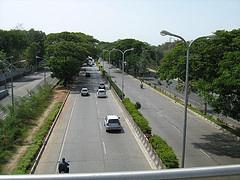British Government Pledges Support for Mumbai-Bangalore Corridor
During his visit to India, British Prime Minister David Cameron announced that the UK government would provide funding for the development of the Mumbai-Bangalore corridor. This ambitious project aims to create a thriving economic zone spanning over 1,000 km.
 Camron offers financial aid to India to complete the development of Mumbai-Bangalore corridor.
Camron offers financial aid to India to complete the development of Mumbai-Bangalore corridor.
Envisioned to encompass numerous districts and cities, the Mumbai-Bangalore corridor has the potential to house 2 to 3 million people in each city. Upon completion, this corridor is expected to generate millions of employment opportunities, transforming the economic landscape. Cameron expressed Britain's commitment to assisting India in realizing this transformative project.
Phased Development Approach
Cameron emphasized the importance of a phased approach, advocating for the initial development of physical infrastructure, followed by the establishment of social infrastructure. This comprehensive strategy aims to create a sustainable and well-rounded environment for residents and businesses alike.
Cameron affirmed, "Our government is happy to see the development of Mumbai-Bangalore corridor," signaling their willingness to provide financial aid and collaborate with India on the project. This partnership underscores the shared vision for economic growth and development.
The British Prime Minister's office revealed that officials have been diligently assessing the 1,000 km corridor, estimating the project cost at $25 billion. This investment will connect the commercial capital with the technology hub, fostering innovation and driving economic prosperity.
 Mumbai-Bangalore corridor needs to be developed, says Cameron.
Mumbai-Bangalore corridor needs to be developed, says Cameron.
Expertise and Solutions from Britain
Addressing business leaders and workers at Hindustan Unilever Limited, Cameron emphasized Britain's ability to provide comprehensive solutions, stating, that the United Kingdom possesses skilled architects, planners, and finance experts capable of providing better solutions for the project.
Cameron projected that the Mumbai-Bangalore corridor would contribute 11.8% of India's total GDP by 2020 and house 5.8% of the country's population. This underscores the corridor's immense economic significance and its potential to drive national growth.
The initial phase will prioritize physical infrastructure, including power generation, telecommunications, and transportation networks. Subsequent phases will focus on social infrastructure, such as education and healthcare facilities, ensuring a holistic approach to development.
Parallel Initiatives and Financial Commitment
Plans are also underway to develop 24 industrial cities along the Delhi-Mumbai railway line with assistance from Japan. The British government has pledged $1.55 million (one million Pounds) to the Mumbai-Bangalore corridor project. Completion of the project is expected to generate over half a million direct jobs and potentially over two million jobs in total, considering indirect employment opportunities.